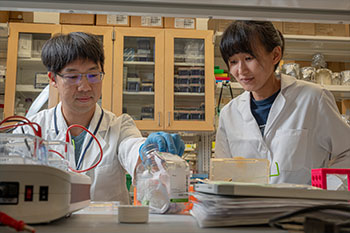
Ming Chen, PhD, is the senior author of a paper published on Oct. 4th, 2025, in Oncogene titled “Targeting SREBP-Dependent Lipogenesis Potentiates the Anti-Tumor Activity of Docetaxel by Increasing Membrane Permeability and Intracellular Drug Accumulation.”
According to the American Cancer Society, approximately one in eight men in the United States will be diagnosed with prostate cancer (PC) during his lifetime. Different treatment options are available for PC, including surgery and radiation for primary localized tumors. In addition, docetaxel, one of the cornerstones of chemotherapy, is used for advanced and metastatic PC.
Although treatment options for patients with advanced PC have vastly expanded in the past 15 years, docetaxel remains an essential treatment component due to de novo or cross resistance to androgen receptor (AR) signaling inhibitors. In other words, docetaxel is an important treatment option for PC because some cancers have trouble responding to hormone-based therapies that target the AR. As such, the identification of new strategies that sensitize tumor cells to docetaxel treatment is of critical importance and will have a clear clinical impact on patient care.
To enter a cell, chemotherapeutic agents require interaction with its membrane, a barrier that can restrict the efficacy of chemotherapy. Membrane fluidity and permeability depend on the unsaturated-to-saturated lipid ratio. Chen and colleagues discovered that a new oral drug called FGH10019, which blocks a protein known as SREBP (Sterol Regulatory Element-Binding Protein), can change the way cancer cells make fats. This shift increases the amount of healthy fats called polyunsaturated fatty acids in the cells, making their outer membranes more flexible and permeable. As a result, more docetaxel can enter the cancer cells, potentially making the treatment more effective.

“Lipid metabolism is among the most frequently dysregulated metabolic processes in human cancer,” said Chen. “Yet the way that the end products of lipogenesis, cellular lipids, and their composition are altered to support various aspects of cancer is poorly understood. This is the first study to reveal that de novo lipogenesis may protect prostate cancer cells from chemotherapeutics by increasing the levels of saturated fatty acids, thus forming packed lipid membranes that limit the entry of docetaxel into prostate cancer cells.”
Chen and colleagues further demonstrated that cotreatment with FGH10019 and docetaxel leads to strong synergistic anti-tumor activity against prostate cancer both in vitro and in vivo. The study by the Chen Lab reveals that increased lipid biosynthesis in cancer may protect cancer cells from chemotherapeutics, suggesting that targeting lipid metabolism may potentially improve the efficacy of chemotherapy against PC for patients.
Funding for this study was provided by The Department of Defense (DoD) Prostate Cancer Research Program W81XWH2010185 and National Institutes of Health (NIH) grant R01 CA269211.